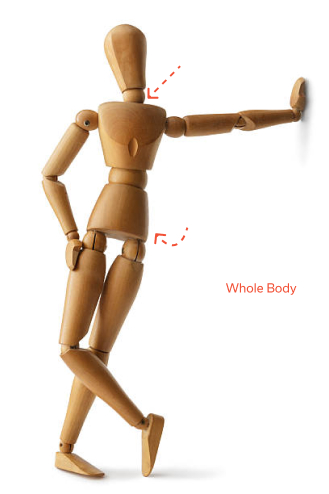Optimal Sleeping Positions for Frozen Shoulder Relief
By Nigel ChuaAnyone who has ever dealt with a frozen shoulder knows the frustration from sleepless nights. The daytime pain and stiffness are bad enough. Then comes nighttime when a stiff shoulder hinders a good night's sleep.
The shoulder performs complex and vital functions and has the widest range of motion of any joint in the human body. Similarly, it is also one of the most overused and prone to injuries.

A Singapore study found that 2% to 5% of the general population is likely to have a frozen shoulder, mostly women. The condition was broadly categorized into primary, with no clear cause, and secondary, where the cause is identified through medical history, exams, and imaging.
Frozen shoulder patients experience a variety of symptoms, including shoulder pain, discomfort, and inability to sleep. Fortunately, several studies cover basic frozen shoulder pain relief methods you can add to your routine and tips on how to sleep with a frozen shoulder.
In this article, we will explore these methods and understand the root causes and symptoms to help with management and prevention. More importantly, we will determine the best sleeping positions for frozen shoulder pain relief.
Why is a Frozen Shoulder Painful at Night?
Medically termed "adhesive capsulitis," a frozen shoulder occurs when your shoulder joint remains immobile for an extended period. This typically happens after keeping your shoulder still for a while following surgery or an injury, making it incredibly stiff.
The three stages of a frozen shoulder include the following:
- Freezing Stage (first stage is the most painful, lasting 2–9 months)
- Frozen Stage (extreme stiffness, lasting 4-6 months)
- Thawing Stage (the final stage where improvement starts)
There are a couple of reasons behind the increased shoulder pain you might feel at night.
First, as your body settles down for sleep, blood flow naturally slows. This can lead to increased inflammation and pressure around the already irritated affected area, making that dull ache turn into a throbbing pain.
Second, how you position yourself during sleep can put unwanted stress on the frozen shoulder capsule. Falling asleep in the wrong position can compress the affected shoulder and strain the joint and surrounding muscles.
Finally, a frozen shoulder patient feels the worst pain at night because the shoulder has been in use all day, leading to increased stiffness and soreness. As the day progresses, daily activities can cause inflammation and fatigue in the shoulder joint, making the discomfort more pronounced by evening.
Resting at night without proper support can further aggravate the pain, disrupting sleep and hindering the healing process.
Common Frozen Shoulder Symptoms
The symptoms of a frozen shoulder are noticeable. These can significantly impact daily activities and quality of life. Understanding its common symptoms and effective management strategies is crucial for alleviating discomfort and promoting recovery.
Here are some warning signs that you are dealing with a frozen shoulder.
Shoulder Pain Especially at Night
Patients with a frozen shoulder often experience extreme pain at night. This is due to the shoulder's immobility and inflammation from daytime activities. You may expect severe pain during the freezing stage.
Pain and Stiffness
This is the most common symptom of a frozen shoulder, worsening over time. The stiffness in the shoulder joint significantly limits the range of motion, making it difficult to move your arm in all directions, including reaching behind your back or combing your hair. An achy feeling in the shoulder muscles and upper arm often accompanies this stiffness.
Achy Feeling in Shoulder Muscles and Upper Arm
The persistent aches in the shoulder muscles and upper arm can be constant and nagging. This ache is typically present throughout the day and can fluctuate in intensity, sometimes lessening with gentle movement and increasing with more strenuous activities.
Limited Range of Motion
A frozen shoulder can significantly restrict your ability to move your arm. You may have trouble with simple tasks such as getting dressed, reaching overhead, or buckling your seatbelt.
Difficulty Sleeping
The stiffness and limited range of motion caused by a frozen shoulder can make it difficult to find a comfortable sleeping position. Any tossing and turning can irritate the shoulder and wake you up.
Seek professional medical advice if you are experiencing any of these symptoms to discuss treatment options. Early diagnosis and treatment can help to improve your symptoms and prevent further damage or complications.
Treatments often focus on physical therapy, stretching and strengthening exercises, and in some cases, medication to reduce inflammation and discomfort.
A frozen shoulder physiotherapy treatment not only helps relieve pressure from your shoulder issues but also significantly helps with sleep problems. It can address the pain and stiffness contributing to difficulty sleeping in several ways.
A leading physical therapy provider in Singapore like Phoenix Rehab offers pain management techniques and tailored treatment in a patient-centered environment. These treatments usually involve initial consultation to identify the root causes of your condition, and an in-depth review to fully understand symptoms.
Must Try Sleep Positions with Frozen Shoulder
After thorough assessment and treatment, physiotherapy experts often educate patients on pain management and prevention. In the case of a frozen shoulder, it is essential to find the right sleeping position and pillow support.
We'll expand below on how to sleep with a frozen shoulder and find the most comfortable position.
Sleeping on Your Back
This is generally considered the best position for a frozen shoulder because it takes pressure off the joint. If you prefer to sleep on your back, prop yourself with extra pillows between your arms to keep them comfortably supported.
Alternatively, you can use a support pillow under your upper back and shoulders to elevate your torso slightly. Experiment with different pillow arrangements that minimize pain and support your shoulder effectively.
Sleeping on Your Unaffected Shoulder
If sleeping on your back isn't comfortable, this is the next best option.
A body pillow helps when sleeping on your side. It supports and helps you stay on your side throughout the night, preventing you from rolling onto your affected shoulder. You may find it more comfortable with the pillow positioned diagonally over your side.
Position the pillow close to your body, tuck it into your top armpit, and hug it with your arms. Keep another one between your knees, too. This neutral position keeps your spine and hips aligned, relieving pressure on the frozen shoulder.
Avoid These Sleep Positions with Frozen Shoulder
Maintaining proper sleep positions is crucial for preventing further aggravation of a frozen shoulder. Below are some positions to steer clear of, reducing the risks of developing frozen shoulder or worsening existing symptoms.
Sleeping on your Stomach
This position can put a lot of strain on your shoulder joint, so it's best to avoid it altogether. It can also further irritate your already inflamed shoulder capsule.
Affected Arm Hanging
Don't let your affected arm hang off the edge of the bed. This can stretch the already tight muscles and connective tissue in your shoulder, leading to more pain.
Tips on How to Sleep with a Frozen Shoulder
Aiming for a good night's sleep with a frozen shoulder is essential for managing discomfort and promoting healing. Here are general tips on how you can still comfortably sleep with a frozen shoulder.
Apply Heating Pads
Apply a heating pad to your shoulder for 15-20 minutes to loosen tight muscles and relieve pressure in the affected area. Doing this before bed can help you drift to sleep easily, and even induce relaxation and deep sleep.
Relax Your Shoulders
Throughout the day, make an effort to rest your shoulder to reduce pain and inflammation. Avoid activities that exacerbate discomfort and maintain good posture to minimize strain on the affected area.
Warm Shower
Take a warm shower for more or less 15 minutes before bedtime to relieve stiffness. The warmth can loosen muscles and increase mobility, making it easier to find a comfortable sleeping position.
Exercises
Perform gentle stretches, ROM exercises, and pendulum swing exercises before bed. This can improve blood flow and reduce stiffness, making it easier to fall asleep.
Over-the-Counter Medications
If pain is keeping you up, consider taking an over-the-counter pain reliever recommended by your doctor. Treatment painkillers such as NSAIDs can provide temporary relief from shoulder pain.
Invest in Good Bed and Pillow
Invest in a comfortable bed and firm-enough pillow that supports your head and neck. This will help keep your spine aligned and reduce tension in your shoulder.
Physiotherapy Treatment
If the pain is severe or you're having trouble managing it on your own, consult a professional physical therapist. They can provide treatment options, recommend specific exercises, and even suggest medications to help manage your pain.
The best sleeping position for you will depend on your individual situation and what feels most comfortable. It may take some trial and error to find the right position for you. If you're struggling to sleep comfortably, talk to your doctor or physiotherapist for personalized advice and treatment.
Browse other articles by category
Physiotherapy for Knee Pain Physiotherapy For Slipped Disc Physiotherapy for Neck Pain PHYSIOTHERAPY
PHYSIOTHERAPY
 Hand Therapy
Hand Therapy
 Alternative
Alternative
 Massage
Massage
 Traditional Chinese Medicine Treatment
Traditional Chinese Medicine Treatment
 Rehab
Rehab
 Physiotherapy For Lower Back Pain
Physiotherapy For Shoulder Pain
Orthopedic Doctors, Insurance & Healthcare
Physiotherapy For Upper Back Pain
Frozen Shoulder
Physiotherapy for Back Pain
Physiotherapy For Lower Back Pain
Physiotherapy For Shoulder Pain
Orthopedic Doctors, Insurance & Healthcare
Physiotherapy For Upper Back Pain
Frozen Shoulder
Physiotherapy for Back Pain

 Whatsapp us now
Whatsapp us now